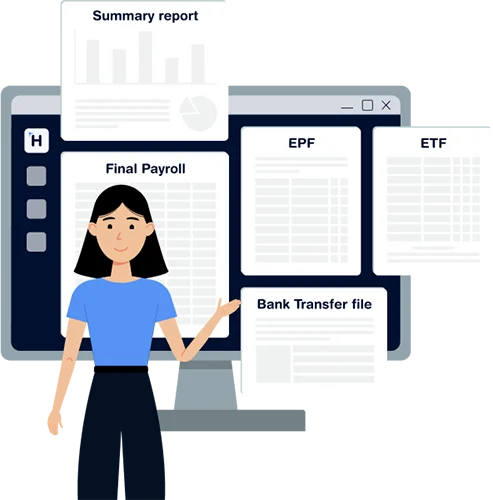Gratuity is a mandatory end-of-service benefit in Sri Lanka for employees who have served more than five years. Many SMEs struggle with manual calculations, which can lead to compliance risks, errors, and employee mistrust. Payroll and HR software makes gratuity easier to calculate, track, and report, ensuring accuracy, transparency, and long-term employee trust.
For many Sri Lankan SMEs, gratuity is one of the most misunderstood yet legally required components of employee compensation. While it may not come up every month like EPF or ETF, it plays a crucial role in long-term employee retention and financial planning.
Calculating gratuity manually can be tedious, especially for businesses with multiple employees, incomplete records, or evolving salary histories. This is where payroll and HR software becomes more than just a convenience, turning into an essential tool for accuracy, compliance, and employee trust.
Here are five clear benefits of using payroll and HR software to manage and calculate gratuity.
1. Automated and Accurate Gratuity Calculations
Manual calculations are prone to human error, especially when factoring in years of service, basic salary fluctuations, and breaks in employment.
Payroll software with gratuity features:
- Automatically tracks employee start dates and tenure.
- Uses the correct base salary (typically the last drawn salary).
- Applies the right formula based on Sri Lankan gratuity law.
This eliminates guesswork and ensures gratuity is calculated fairly and consistently for each eligible employee.
2. Transparent Visibility for Employees and Employers
-
Employees can view their gratuity entitlement at any time through their portal, building trust and financial security.
-
Employers can forecast liabilities, plan long-term payroll budgets, and access historical records for audits or exit processing.
With an integrated HR system:
This transparency strengthens confidence on both sides.
3. How does payroll software simplify employee exit processes?
When an employee resigns or retires, calculating final dues is one of the most time-sensitive tasks for HR or finance teams. With payroll software:
- Gratuity is automatically included in final payment calculations
- Proration or special adjustments (for early exits) are handled accurately
- Reports and calculations are stored for audit purposes
This ensures a smooth and professional exit experience, which can positively affect employer branding.
4. Ensuring Compliance with Sri Lankan Labour Law
Sri Lankan labour law requires gratuity payments for employees with over five years of service, and failing to comply can lead to penalties or disputes.
By using HR and payroll software that includes local compliance logic, SMEs can:
- Stay updated with changes in gratuity-related rules
- Generate compliant gratuity reports on demand
- Avoid missed calculations or legal oversights
This is especially useful for SMEs that don’t have a full-time HR officer or legal team.
5. How gratuity tracking improves retention and wellbeing
Employees who know their gratuity is being tracked properly and will be paid fairly are more likely to feel secure and stay longer. Offering this kind of financial visibility can be a powerful retention tool.
In sectors like education, manufacturing, or services, where long-term staff are common, building loyalty through gratuity tracking can have a real impact on reducing turnover.
Making the Long-Term Commitment of Gratuity Easier to Manage
While gratuity might not be a daily payroll task, it’s a crucial part of building trust and compliance into your HR processes. With the right payroll and HR software, SMEs can calculate, track, and report gratuity easily, empowering both their employees and themselves.
Frequently Asked Questions about Gratuity in Sri Lanka
Q: Why is gratuity important for SMEs?
A: Gratuity is a mandatory end-of-service benefit in Sri Lanka that builds employee trust, supports financial planning, and ensures compliance with labour law.
Q: How does payroll software calculate gratuity?
A: Payroll software automatically tracks tenure, uses the correct base salary, and applies Sri Lankan gratuity law formulas, reducing manual errors.
Q: What compliance benefits does HR software provide?
A: HR software ensures SMEs stay updated with rule changes, generate reports instantly, and avoid penalties for non-compliance.



